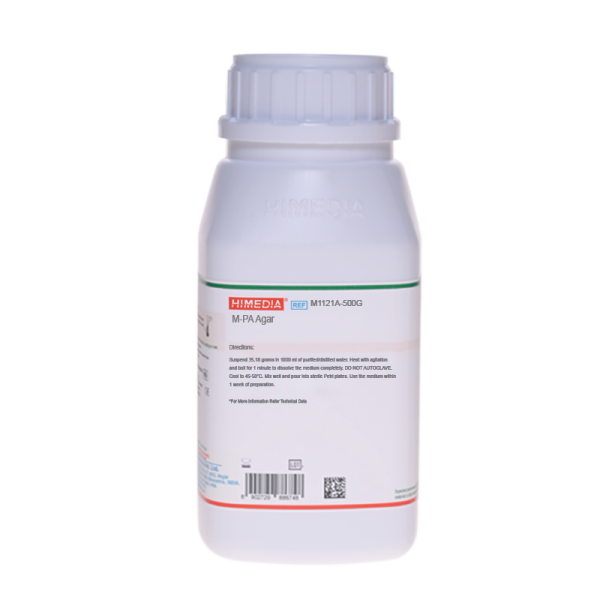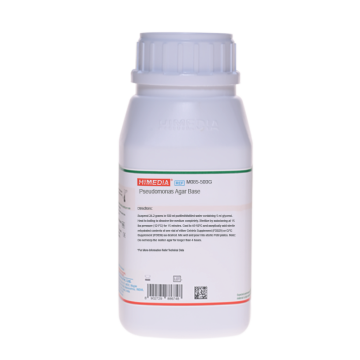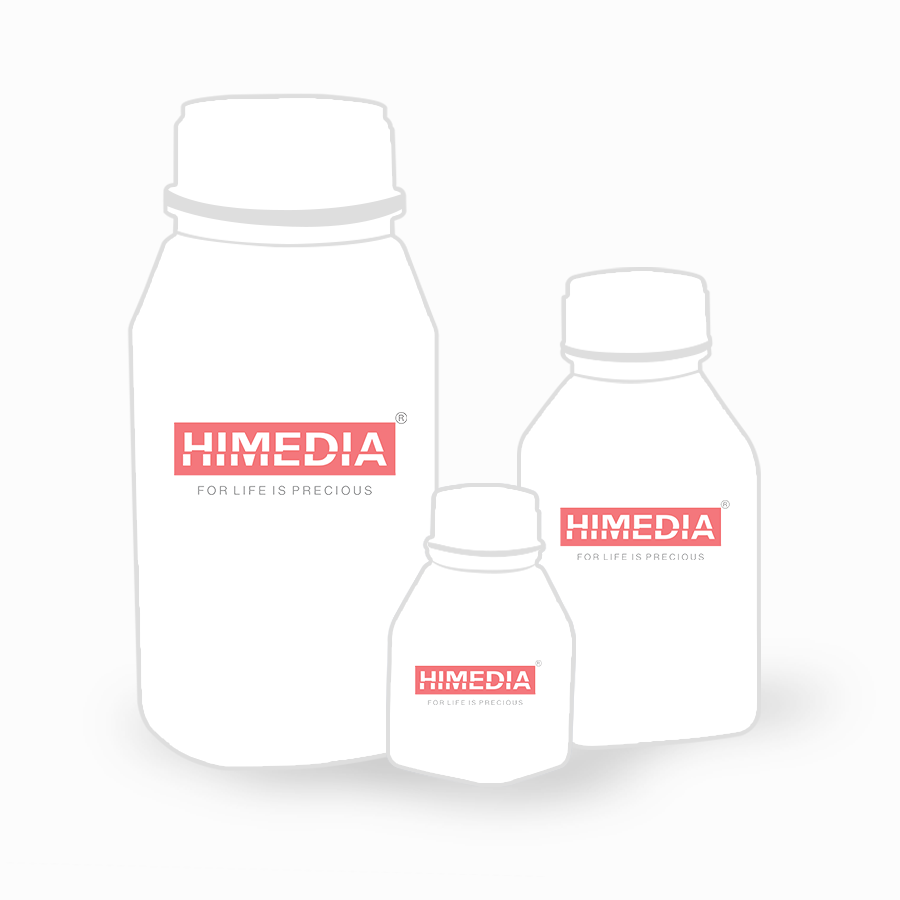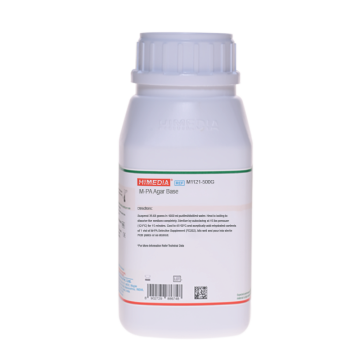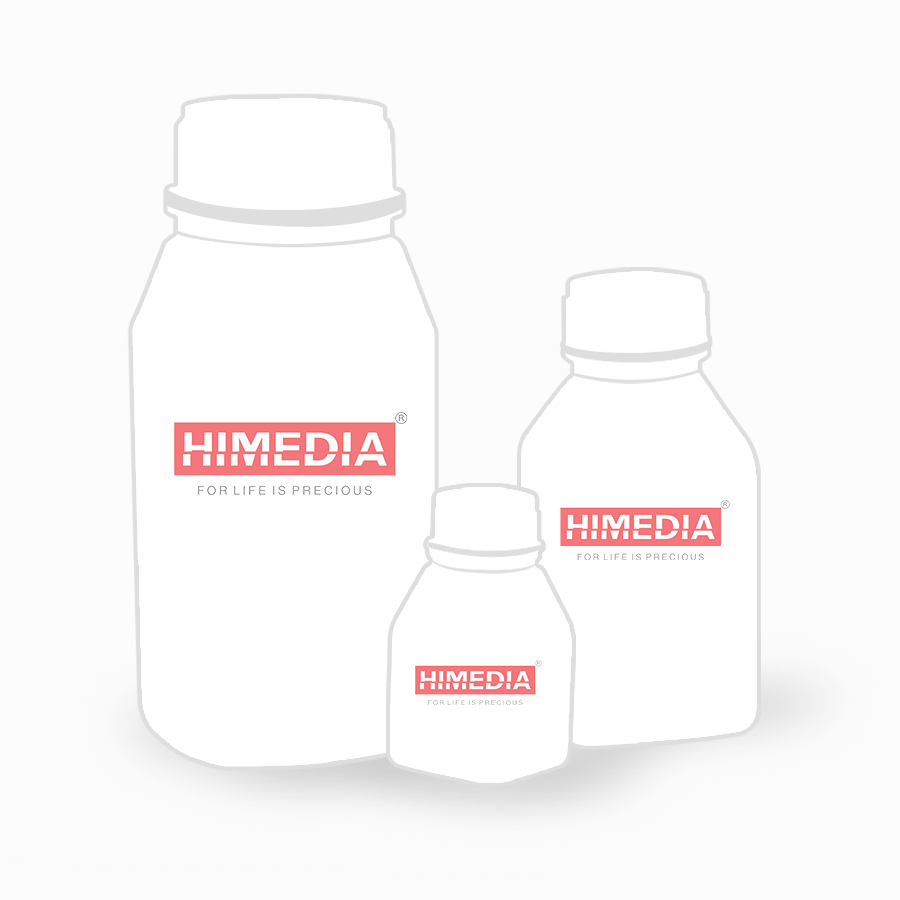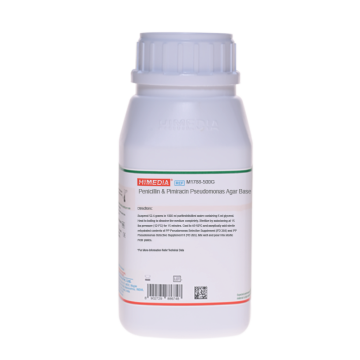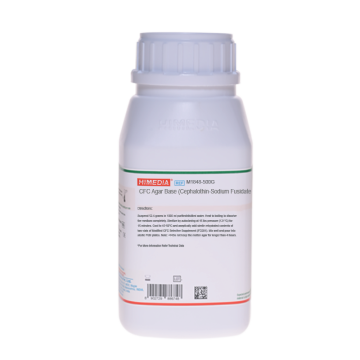 Your enquiry has been submitted
Your enquiry has been submitted
M-PA Agar
M-PA Agar is used for the selective detection and isolation of Pseudomonas aeruginosa by membrane filter technique.
Composition
| Ingredients | Gms / Litre |
|---|---|
| Yeast extract | 2.000 |
| L-Lysine hydrochloride | 5.000 |
| Sodium chloride | 5.000 |
| Xylose | 1.250 |
| Sucrose | 1.250 |
| Lactose | 1.250 |
| Ferric ammonium citrate | 0.800 |
| Sodium thiosulphate | 5.000 |
| Phenol red | 0.080 |
| Magnesium sulphate | 1.500 |
| Kanamycin | 0.008 |
| Nalidixic acid | 0.037 |
| Agar | 12.000 |
Final pH (at 25°C): 7.2±0.1
**Formula adjusted, standardized to suit performance parameters
Directions
Suspend 35.18 grams in 1000 ml of distilled water. Heat with agitation and boil for 1 minute to dissolve the medium completely. DO NOT AUTOCLAVE. Cool to 45-50°C and pour into sterile Petri plates. Use the medium within 1 week of preparation.
Principle And Interpretation
The MPN (Most Probable Number) technique results in satisfactory recovery levels of Pseudomonas aeruginosa, but is not usable for the testing of large-volumes water samples and they also lack precision for the recovery of Pseudomonas aeruginosa.
Levin and Cabelli devised M-PA Agar as a selective membrane filter medium for Pseudomonas aeruginosa (1). Many of the filter media used for the recovery of P. aeruginosa lack specificity and are of limited value when a large heterogeneous microbial flora is present in the water samples. M-PA Agar incorporates four antibiotics kanamycin, nalidixic acid, sulfapyridine and cycloheximide which render the medium moderately selective. The original medium was modified by raising the pH (2) and altering the content or concentration of ingredients (3). This media is included in part 914 C, Membrane Filter Technique for P. aeruginosa (Tentative) in the 16th / 19th Edition of Standard Methods for the Examination of Water and Waste water (4).
Brodsky and Ciebin (5) further modified these media by eliminating Sulfapyridine and Cycloheximide. This modified M-PA Agar helps in enumeration of Pseudomonas aeruginosa within 24 hours of incubation at 41.5°C compared to 72 hours for a presumptive M-PN test.
Yeast extract, lysine and carbohydrates provide nitrogeneous compounds, energy sources and vitamins required for bacterial metabolism. Sodium chloride maintains osmotic equilibrium. Inorganic salts provide essential ions. Kanamycin inhibits protein synthesis in gram-positive organisms (6). Cycloheximide (FD202) inhibits fungal flora. Nalidixic acid blocks replication of susceptible gram-negative bacteria (6). Phenol red is the pH indicator which turns yellow under acidic conditions due to fermentation of the carbohydrates.
After filtration of the water sample through a sterile 0.45 µm gridded filter, place the membrane filter on the surface of plates of M-PA Agar taking care to avoid the entrapment of bubbles between the agar and filter surface. Incubate for 24 hours at 41.5±0.5°C in an aerobic atmosphere. Optimal colony density on membrane filters is 20-200 colonies. All colonies on the filter
are counted when the density is 2 or fewer per square; the average of 10 squares is determined when the count is 3-10 colonies per square and the average of 5 squares is determined when the count is 10-20 colonies per square. The average count per square is multiplied by 100 times the reciprocal of the dilution to give colonies per ml.
Quality Control
Appearance: Light yellow to pink homogeneous free flowing powder
Gelling: Firm, comparable with 1.2% Agar gel.
Colour and Clarity of prepared medium: Orange red coloured clear to slightly opalescent gel forms in Petri plates
Reaction: Reaction of 3.52% w/v aqueous solution at 25°C. pH: 7.2±0.1
pH: 7.10-7.30
Cultural Response: Cultural characteristics observed after an incubation at 41.5 ± 0.5°C for upto 72 hours.
| Organism | Inoculum (CFU) | Growth | Colour of medium |
|---|---|---|---|
| Escherichia coli ATCC 25922 | >=10³ | inhibited | |
| Klebsiella pneumoniae ATCC 13883 | >=10³ | inhibited | |
| Pseudomonas aeruginosa ATCC 27853 | 50-100 | good-luxuriant | pink |
| Salmonella Typhi ATCC 6539 | >=10³ | inhibited | |
| Staphylococcus aureus ATCC 25923 | >=10³ | inhibited |
Storage and Shelf Life
Store dehydrated powder and prepared medium at 2 - 8°C. Use before expiry date on the label.
Reference
- Levin M. A. and Cabelli V. J., 1972, Appl. Microbiol., 24:864.
- Carson L. A., Peterson M, J., Favero M. S., Doto I. L., Collins D. E. and Levin M. A., 1975, Appl. Microbiol., 30:935.
- Dutka B. J. and Kwan K. K., 1977, Appl. Environ. Microbiol., 33:240.
- Greenberg A. E., Trussell R. R. and Clesceri L. S., (Eds.), 1985, Standard Methods for the Examination of Water and Wastewater, 16th / 19th Ed., APHA, Washington, DC.
- Brodsky M. H. and Ciebin Y. B. W., 1978, Appl. Environ., Microbiol,36:36.
- Estevez R. A., 1984, Bacteri
| Product Name | M-PA Agar |
|---|---|
| SKU | M1121A |
| Product Type | Regular |
| Physical Form | Powder |
| Origin | Animal |
| Packaging type | HDPE |
| References | 1.Levin M. A. and Cabelli V. J., 1972, Appl. Microbiol., 24:864.2.Carson L. A., Peterson M, J., Favero M. S., Doto I. L., Collins D. E. and Levin M. A., 1975, Appl. Microbiol., 30:935.3.Dutka B. J. and Kwan K. K., 1977, Appl. Environ. Microbiol., 33:240.4.Greenberg A. E. , Trussell R. R. and Clesceri L. S., (Eds.), 1985, Standard Methods for the Examination of Water andWastewater, 16th / 19th Ed., APHA, Washington, DC.5.Estevez R. A., 1984, Bacteriologic plate media: review of mechanisms of action. Lab. Med. 15:258. |
| Customized Product Available | No |



